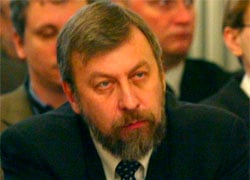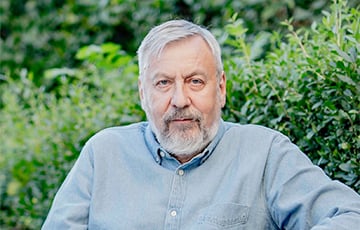Andrei Sannikov: “Lukashenka is preparing Belarus’ surrender to Russia”
47- 1.04.2008, 9:54

“Alyaksandr Lukashenka is consciously set to break relations with the US, after which rupture of relations with Europe could follow, as he is preparing surrender of Belarus to Russia. And he needs scapegoats to blame for these things happening,” stated the international coordinator of the Charter’97, a member of the organising committee of the civil campaign “European Belarus” Andrei Sannikov, commenting on the intention of the Belarusian authorities to reduce staff of the Belarusian mission in Washington again.
The Second international Conference dedicated to the memory of the first Estonian president Lennart Meri took place in Tallinn under the auspices of Estonian president Toomas Hendrik Ilves and was dedicated to problems of Europe. Prime-ministers of Estonia and Georgia, Foreign Ministers and Defence Ministers of Lithuania, Latvia, Estonia, Director-General for External and Politico-Military Affairs at the General Secretariat of the Council of the European Union Robert Cooper, European Enlargement Commissar Olli Rehn, high-ranking diplomats from Europe and the US, members of the European Parliament and national parliaments of the EU countries, leading international analysts and journalists took part in the conference.
The international coordinator of the Charter’97, a former deputy Foreign Minister of Belarus Andrei Sannikov and the head of “We Remember” foundation Iryna Krasouskaya have taken part in the conference as Belarus representatives.
- The conference was important, as it took place right on the eve of the NATO summit in Bucharest. By the way, many participants of the conference flew from Tallinn to Bucharest directly. Not only issues of the NATO enlargement, but of further enlargement of the European Union were discussed at the conference, as well as issues of European international security, relations with Russia and Europe’s relations with neighbouring countries, including Belarus, -- Andrei Sannikov noted in an interview to the Chater’97 press-center.
What exactly has been said about Belarus at the conference?
- Naturally, events of March 25-27 had their consequences for the international community. The topic of Belarus, as a European neighbour where beating of people during peaceful protests continues, where political prisoners exist, worries both our neighbours and the EU in general. It was said at the conference that efforts of democratic states should be concentrated on protection of human rights in Belarus, on release of political prisoners and prevention of application of force by the regime. The US representatives called upon Europeans to take appropriate steps against Lukashenka’s regime.
What other questions were discussed at the conference?
- In general, the central intrigue of this conference, like the NATO summit, is Membership Action Plan for Ukraine and Georgia. This problem hasn’t been solved yet, and it won’t be solved during Bucharest summit at the level of the presidents. In any case, both Georgia and Ukraine are viewed by the EU and the US as future members of the EU and the NATO. Today differences on this issue between the US and Germany exist, however the number of supporters of including the two post-Soviet republics into the Euroatlantic space is steadily growing. In any case, disagreement between the US and Germany on the issue of the EU and NATO membership does not influence their policy towards Belarus. Full understanding of the situation and an appropriate view on how this situation should be solved exist here. As the conference was held in Estonia, it is natural that the position of the Baltic States and of the countries of Northern Europe on international issues has been discussed in detail. This group of the states is united in what concerns the further growth of both the EU and the NATO. They are adhering to the policy of open doors. By the way, representatives of these countries said that one day Belarus and Moldova would be eligible to qualify for membership in the European Union.
What is Your evaluation of the decision of the Belarusian Foreign Ministry about additional reduction of the Belarusian Embassy’s staff in Washington and the demand of the Belarusian side to cut the staff of the US Embassy in Minsk again?
- Most likely, some “smart guy” advises Lukashenka to get rid of the US presence in Belarus in order to supposedly facilitate the process of negotiations with Europe. I hope that it is not the Foreign Ministry’s initiative, as even in totalitarian states Foreign Ministries are interested in maintaining and development of relations with the democratic world. I do not think that the Foreign Ministry could recommend doing obvious foolishness, like rupture of relations with the US. Actions of the Belarusian authorities cannot be called anything but provoking the US for severance of relations. Such rupture would have an impact on ties of Belarus not only with Europe, but, strange as it may appear, with Russia and other economically attractive regions of the world. There is another, more dangerous explanation of the actions of the official Minsk. Lukashenka is consciously set to break relations with the US, after which rupture of relations with Europe could follow, as he is preparing surrender of Belarus to Russia. And he needs scapegoats to blame for these things happening.
Russian president Vladimir Putin is expected to arrive to Bucharest to the NATO summit. What could be expected from this visit?
- If this will happen, it will be the first visit of Putin to the NATO summit for the whole period of his rule. And here analysts are lost oneself in conjectures, will it be an address of Putin in Munich, where he outlined the policy of confrontation with the West, or on the contrary, he will use this visit for improving relations with the West, in order to give Medvedev a more favourable basis for development of these relations. The West is essentially ready for the hard line of Russia on all issues, including issues of energy security. Russia’s policy of the recent years has made the West to get ready for possible continuation of energy blackmailing rather seriously. As long as Europe is the main consumer of Russia’s energy resources, counter-measures that are taken today, would have adverse effect for Russia primarily. Today Russia is actively opposing Ukraine’s possible membership in the NATO, however Russian arguments are less taken into account by the West, as Russia’s reputation has been seriously undermined by its anti-democratic policy inside he country.

“We Remember” foundation president Iryna Krasouskaya, Estonian President Toomas Hendrik Ilves and The international coordinator of the Charter’97 Andrei Sannikov










